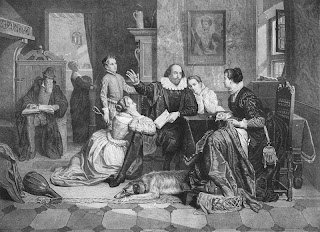In recognition of the upcoming anniversary of the birth (extrapolated, guessed, from his documented baptism) and death some fifty-one years later of
William Shakespeare, I would like to point readers to the excellent
series of postings, recently concluded, from the
Big Think, that not only keep the debate of authorship alive, as well as other aspects of the cult of personality, but go further to explore how prodigy and poetry challenge and strengthen one's own mental capacities and how the timing of the playwright came as the English language was still malleable and under development. These two grammars, Elizabethan and complex, grew together and the body of work culturally crystallized English literary tradition more so than king, country and might. No one wants to entertain that those plays and sonnets germinated as some unsourced leavings and improvisation of the age and the focus on the historical identity of William Shakespeare has never taken away from the genius and richness of his drama, no matter if revised and polished over the years--idealized like the author--or were gifted complete like some religious
acheiropoieta, but it strikes me as perfect that Shakespeare identity is really only knowable through his works, just like his characters, who no matter how real or contrived, are fleshed out with just a few lines and stage-directions but each one is much more than some playful but scant vocabulary.






















